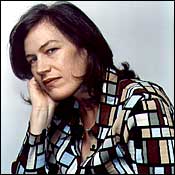
Elizabeth Gaffney, advisory editor for The Paris Review, published her first novel, Metropolis, this month, and it’s not what one might expect from someone at such an echt-Modernist literary journal. Neither confessional nor especially angst-ridden, it’s a big, Victorian-style historical novel, set against the backdrop of the struggle to complete the Brooklyn Bridge. Gaffney talked with Daniel Asa Rose about the book’s conception and design.
How did a nice writer like you end up chronicling the sewer system?
I was casting around for a story big enough for a novel, and I started thinking about New York and its infrastructure. The thing that really focused me was the sewers, which hadn’t been well documented fictionally. I guess you could say my mind was in the gutter.
Was there ever a moment you felt like Philip Johnson unveiling his AT&T building—a Modernist introducing a throwback?
As much as I love nineteenth-century novels, I didn’t want to write an antique reproduction. I wanted to do something that played with that tradition but was also contemporary in its sensibilities and politics and imagery. Besides, I never liked the AT&T building.
In your novel, the sewers are positively lyrical. Did you actually muck up your shoes in service of this book?
I’ve been in a certain number of hidden tunnels—there’s a huge old train tunnel that was rediscovered a number of years ago that you have to enter though a manhole in the middle of Atlantic Avenue. But I haven’t gained access to a sewer tunnel yet. After 9/11, it became impossible.
Smell may be the most sensual aspect of the book. The love interest, Beatrice, for instance, has a “pungent, faintly smoky smell.”
One of the best things about the research I did on the Tweed era was how New York stank. I wanted to have my characters be smelly and human and bodily.
Are modern-day New Yorkers missing out by bathing every day?
Well, I definitely don’t bathe every day. It gives me chapped skin.
The street-gang members in Metropolis communicate their clandestine aims with whistles. Did that theme come from any similar coded intrigue you observed at The Paris Review?
No, that motif stems from being taught by my father to be smart on the street—to be aware of who else was on the block. But another trigger was visiting a sheep farm in Scotland. The shepherd had these crazy whistle patterns that just sounded like a language to me.
So what you’re saying is that The Paris Review really isn’t a pack of sheepdogs?
The Paris Review didn’t have any kind of secret language. They had some good parties, though.
Metropolis
Random House. $24.95.